The Interplay of Culture, Strategy, and Organizational Performance
VerifiedAdded on 2023/05/30
|5
|1158
|283
Discussion Board Post
AI Summary
This discussion board post examines the significant influence of organizational culture on performance, highlighting its role in shaping employee commitment, job satisfaction, and overall organizational effectiveness. It contrasts culture with strategy, suggesting that a strong culture, characterized by shared values and norms, can often outweigh strategic planning in driving success. The post references Peter Drucker's assertion that 'culture eats strategy for lunch' and provides supporting reasons, emphasizing that people are more loyal to culture than strategy. The discussion underscores the importance of a balanced blend of human attitudes, actions, and beliefs in fostering a thriving organizational culture, while also acknowledging that a successful strategy is crucial for maintaining business solvency and enabling the culture to exist. The post concludes by emphasizing the mutually inclusive relationship between culture and strategy, where both elements nurture each other in a continuous cycle of organizational success, using Apple as an example of a company where culture and strategic planning are intertwined.
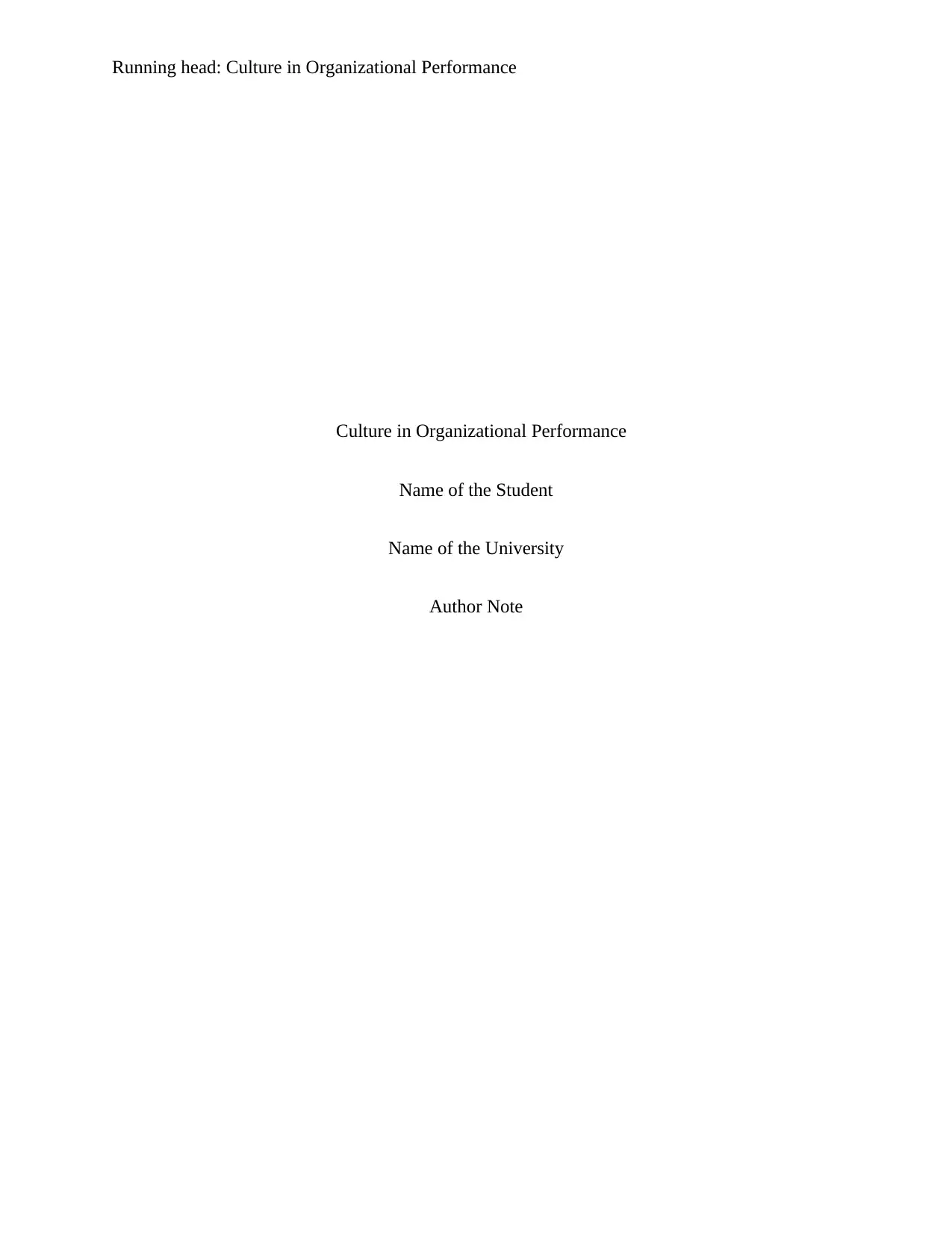
Running head: Culture in Organizational Performance
Culture in Organizational Performance
Name of the Student
Name of the University
Author Note
Culture in Organizational Performance
Name of the Student
Name of the University
Author Note
Paraphrase This Document
Need a fresh take? Get an instant paraphrase of this document with our AI Paraphraser
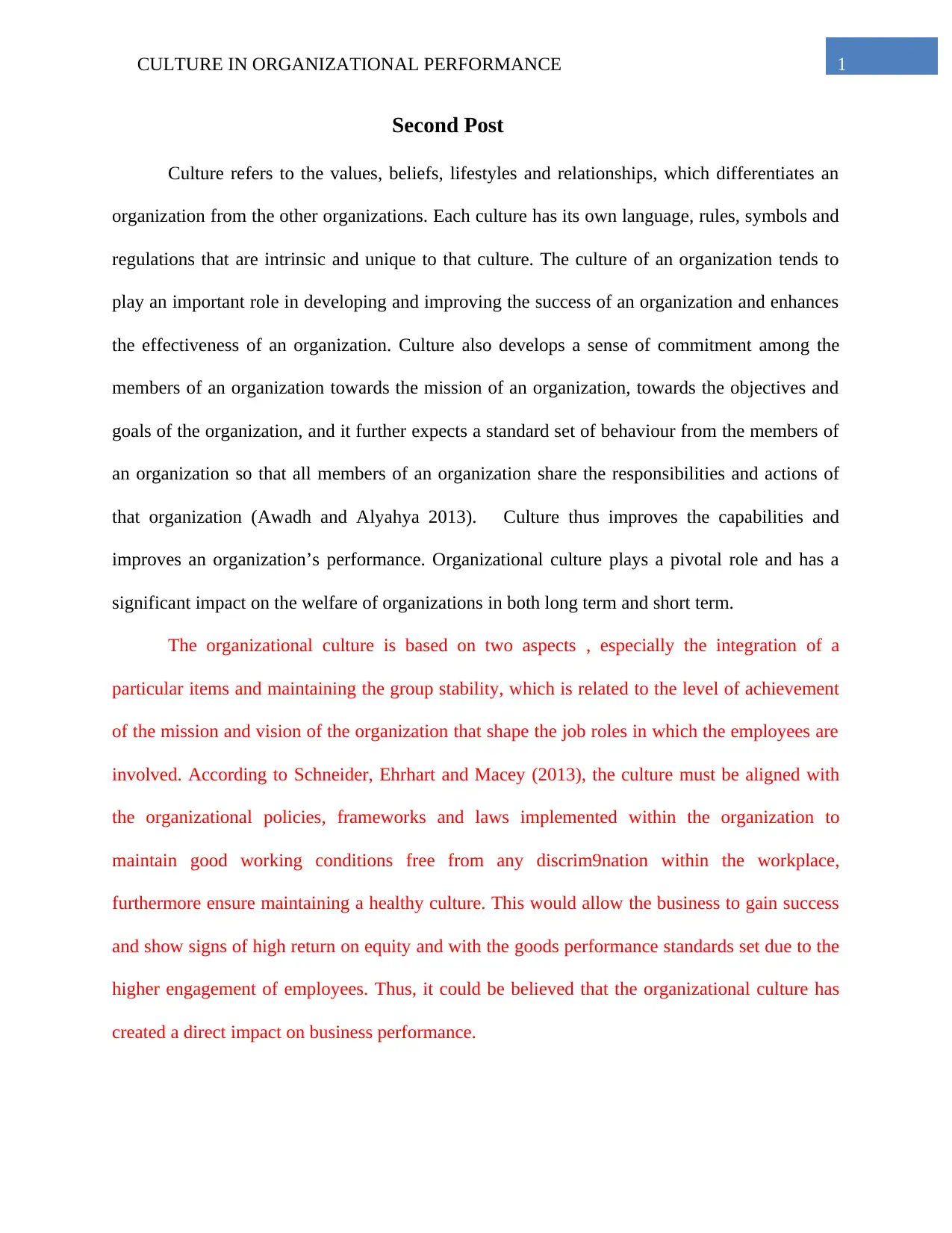
1CULTURE IN ORGANIZATIONAL PERFORMANCE
Second Post
Culture refers to the values, beliefs, lifestyles and relationships, which differentiates an
organization from the other organizations. Each culture has its own language, rules, symbols and
regulations that are intrinsic and unique to that culture. The culture of an organization tends to
play an important role in developing and improving the success of an organization and enhances
the effectiveness of an organization. Culture also develops a sense of commitment among the
members of an organization towards the mission of an organization, towards the objectives and
goals of the organization, and it further expects a standard set of behaviour from the members of
an organization so that all members of an organization share the responsibilities and actions of
that organization (Awadh and Alyahya 2013). Culture thus improves the capabilities and
improves an organization’s performance. Organizational culture plays a pivotal role and has a
significant impact on the welfare of organizations in both long term and short term.
The organizational culture is based on two aspects , especially the integration of a
particular items and maintaining the group stability, which is related to the level of achievement
of the mission and vision of the organization that shape the job roles in which the employees are
involved. According to Schneider, Ehrhart and Macey (2013), the culture must be aligned with
the organizational policies, frameworks and laws implemented within the organization to
maintain good working conditions free from any discrim9nation within the workplace,
furthermore ensure maintaining a healthy culture. This would allow the business to gain success
and show signs of high return on equity and with the goods performance standards set due to the
higher engagement of employees. Thus, it could be believed that the organizational culture has
created a direct impact on business performance.
Second Post
Culture refers to the values, beliefs, lifestyles and relationships, which differentiates an
organization from the other organizations. Each culture has its own language, rules, symbols and
regulations that are intrinsic and unique to that culture. The culture of an organization tends to
play an important role in developing and improving the success of an organization and enhances
the effectiveness of an organization. Culture also develops a sense of commitment among the
members of an organization towards the mission of an organization, towards the objectives and
goals of the organization, and it further expects a standard set of behaviour from the members of
an organization so that all members of an organization share the responsibilities and actions of
that organization (Awadh and Alyahya 2013). Culture thus improves the capabilities and
improves an organization’s performance. Organizational culture plays a pivotal role and has a
significant impact on the welfare of organizations in both long term and short term.
The organizational culture is based on two aspects , especially the integration of a
particular items and maintaining the group stability, which is related to the level of achievement
of the mission and vision of the organization that shape the job roles in which the employees are
involved. According to Schneider, Ehrhart and Macey (2013), the culture must be aligned with
the organizational policies, frameworks and laws implemented within the organization to
maintain good working conditions free from any discrim9nation within the workplace,
furthermore ensure maintaining a healthy culture. This would allow the business to gain success
and show signs of high return on equity and with the goods performance standards set due to the
higher engagement of employees. Thus, it could be believed that the organizational culture has
created a direct impact on business performance.
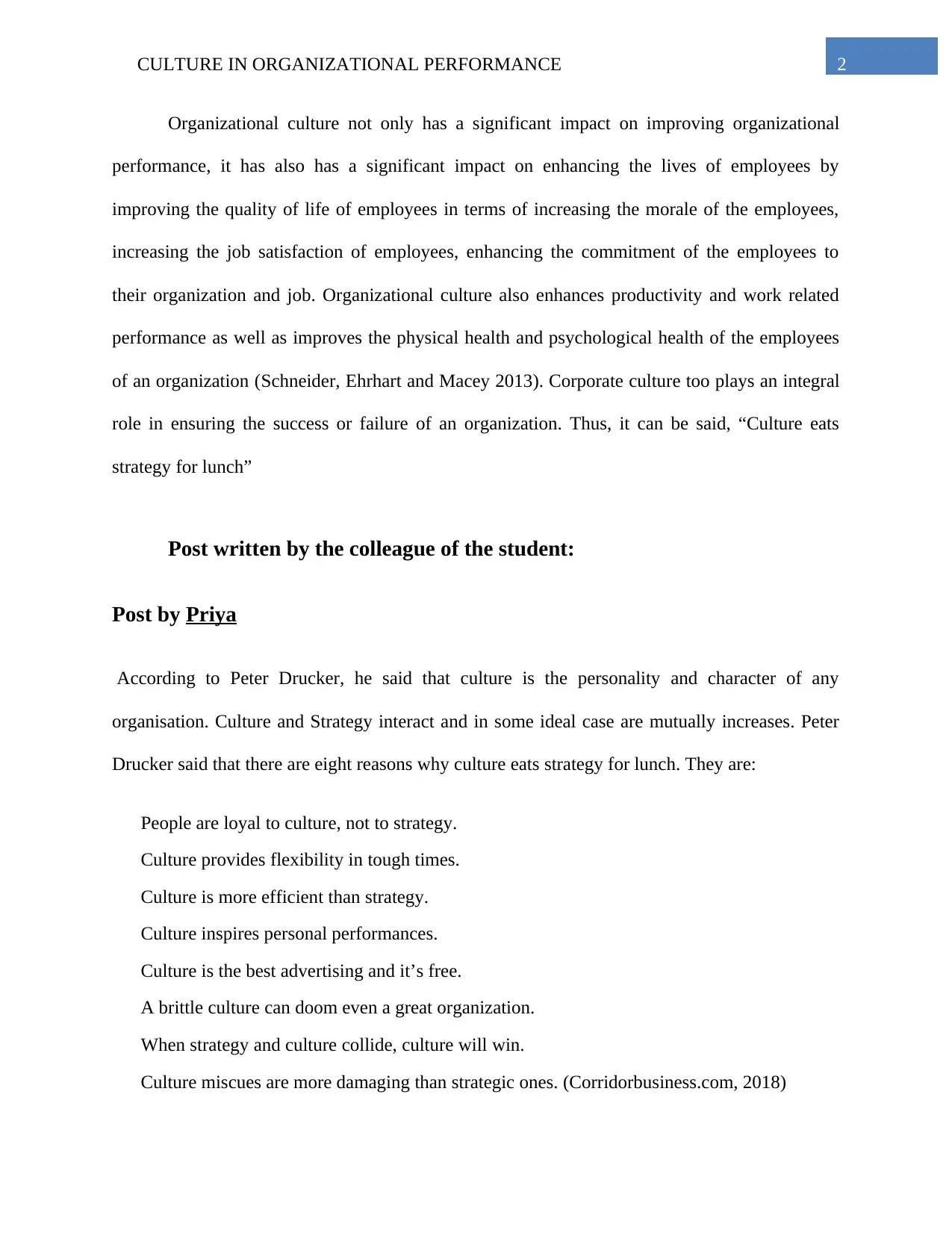
2CULTURE IN ORGANIZATIONAL PERFORMANCE
Organizational culture not only has a significant impact on improving organizational
performance, it has also has a significant impact on enhancing the lives of employees by
improving the quality of life of employees in terms of increasing the morale of the employees,
increasing the job satisfaction of employees, enhancing the commitment of the employees to
their organization and job. Organizational culture also enhances productivity and work related
performance as well as improves the physical health and psychological health of the employees
of an organization (Schneider, Ehrhart and Macey 2013). Corporate culture too plays an integral
role in ensuring the success or failure of an organization. Thus, it can be said, “Culture eats
strategy for lunch”
Post written by the colleague of the student:
Post by Priya
According to Peter Drucker, he said that culture is the personality and character of any
organisation. Culture and Strategy interact and in some ideal case are mutually increases. Peter
Drucker said that there are eight reasons why culture eats strategy for lunch. They are:
People are loyal to culture, not to strategy.
Culture provides flexibility in tough times.
Culture is more efficient than strategy.
Culture inspires personal performances.
Culture is the best advertising and it’s free.
A brittle culture can doom even a great organization.
When strategy and culture collide, culture will win.
Culture miscues are more damaging than strategic ones. (Corridorbusiness.com, 2018)
Organizational culture not only has a significant impact on improving organizational
performance, it has also has a significant impact on enhancing the lives of employees by
improving the quality of life of employees in terms of increasing the morale of the employees,
increasing the job satisfaction of employees, enhancing the commitment of the employees to
their organization and job. Organizational culture also enhances productivity and work related
performance as well as improves the physical health and psychological health of the employees
of an organization (Schneider, Ehrhart and Macey 2013). Corporate culture too plays an integral
role in ensuring the success or failure of an organization. Thus, it can be said, “Culture eats
strategy for lunch”
Post written by the colleague of the student:
Post by Priya
According to Peter Drucker, he said that culture is the personality and character of any
organisation. Culture and Strategy interact and in some ideal case are mutually increases. Peter
Drucker said that there are eight reasons why culture eats strategy for lunch. They are:
People are loyal to culture, not to strategy.
Culture provides flexibility in tough times.
Culture is more efficient than strategy.
Culture inspires personal performances.
Culture is the best advertising and it’s free.
A brittle culture can doom even a great organization.
When strategy and culture collide, culture will win.
Culture miscues are more damaging than strategic ones. (Corridorbusiness.com, 2018)
⊘ This is a preview!⊘
Do you want full access?
Subscribe today to unlock all pages.

Trusted by 1+ million students worldwide
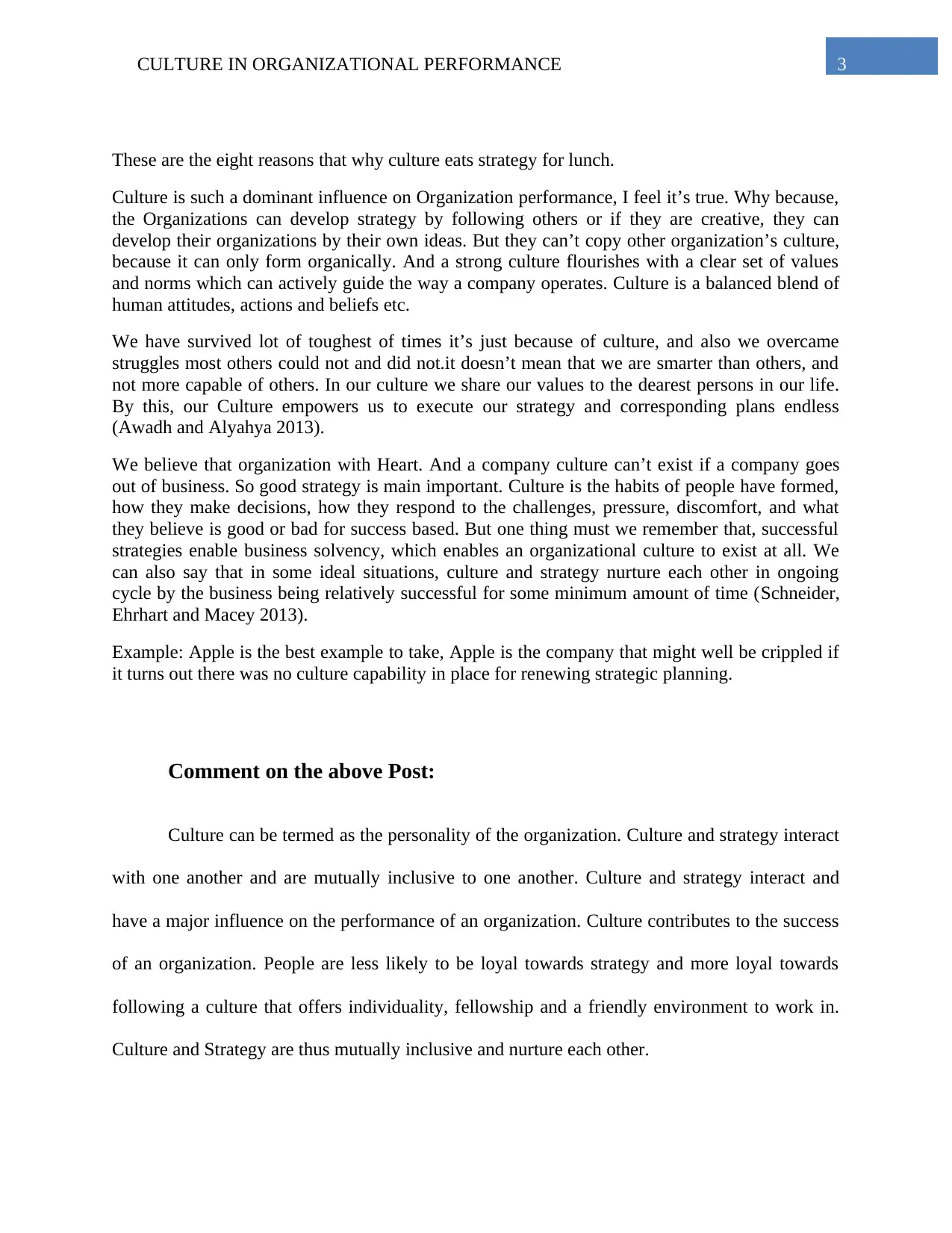
3CULTURE IN ORGANIZATIONAL PERFORMANCE
These are the eight reasons that why culture eats strategy for lunch.
Culture is such a dominant influence on Organization performance, I feel it’s true. Why because,
the Organizations can develop strategy by following others or if they are creative, they can
develop their organizations by their own ideas. But they can’t copy other organization’s culture,
because it can only form organically. And a strong culture flourishes with a clear set of values
and norms which can actively guide the way a company operates. Culture is a balanced blend of
human attitudes, actions and beliefs etc.
We have survived lot of toughest of times it’s just because of culture, and also we overcame
struggles most others could not and did not.it doesn’t mean that we are smarter than others, and
not more capable of others. In our culture we share our values to the dearest persons in our life.
By this, our Culture empowers us to execute our strategy and corresponding plans endless
(Awadh and Alyahya 2013).
We believe that organization with Heart. And a company culture can’t exist if a company goes
out of business. So good strategy is main important. Culture is the habits of people have formed,
how they make decisions, how they respond to the challenges, pressure, discomfort, and what
they believe is good or bad for success based. But one thing must we remember that, successful
strategies enable business solvency, which enables an organizational culture to exist at all. We
can also say that in some ideal situations, culture and strategy nurture each other in ongoing
cycle by the business being relatively successful for some minimum amount of time (Schneider,
Ehrhart and Macey 2013).
Example: Apple is the best example to take, Apple is the company that might well be crippled if
it turns out there was no culture capability in place for renewing strategic planning.
Comment on the above Post:
Culture can be termed as the personality of the organization. Culture and strategy interact
with one another and are mutually inclusive to one another. Culture and strategy interact and
have a major influence on the performance of an organization. Culture contributes to the success
of an organization. People are less likely to be loyal towards strategy and more loyal towards
following a culture that offers individuality, fellowship and a friendly environment to work in.
Culture and Strategy are thus mutually inclusive and nurture each other.
These are the eight reasons that why culture eats strategy for lunch.
Culture is such a dominant influence on Organization performance, I feel it’s true. Why because,
the Organizations can develop strategy by following others or if they are creative, they can
develop their organizations by their own ideas. But they can’t copy other organization’s culture,
because it can only form organically. And a strong culture flourishes with a clear set of values
and norms which can actively guide the way a company operates. Culture is a balanced blend of
human attitudes, actions and beliefs etc.
We have survived lot of toughest of times it’s just because of culture, and also we overcame
struggles most others could not and did not.it doesn’t mean that we are smarter than others, and
not more capable of others. In our culture we share our values to the dearest persons in our life.
By this, our Culture empowers us to execute our strategy and corresponding plans endless
(Awadh and Alyahya 2013).
We believe that organization with Heart. And a company culture can’t exist if a company goes
out of business. So good strategy is main important. Culture is the habits of people have formed,
how they make decisions, how they respond to the challenges, pressure, discomfort, and what
they believe is good or bad for success based. But one thing must we remember that, successful
strategies enable business solvency, which enables an organizational culture to exist at all. We
can also say that in some ideal situations, culture and strategy nurture each other in ongoing
cycle by the business being relatively successful for some minimum amount of time (Schneider,
Ehrhart and Macey 2013).
Example: Apple is the best example to take, Apple is the company that might well be crippled if
it turns out there was no culture capability in place for renewing strategic planning.
Comment on the above Post:
Culture can be termed as the personality of the organization. Culture and strategy interact
with one another and are mutually inclusive to one another. Culture and strategy interact and
have a major influence on the performance of an organization. Culture contributes to the success
of an organization. People are less likely to be loyal towards strategy and more loyal towards
following a culture that offers individuality, fellowship and a friendly environment to work in.
Culture and Strategy are thus mutually inclusive and nurture each other.
Paraphrase This Document
Need a fresh take? Get an instant paraphrase of this document with our AI Paraphraser
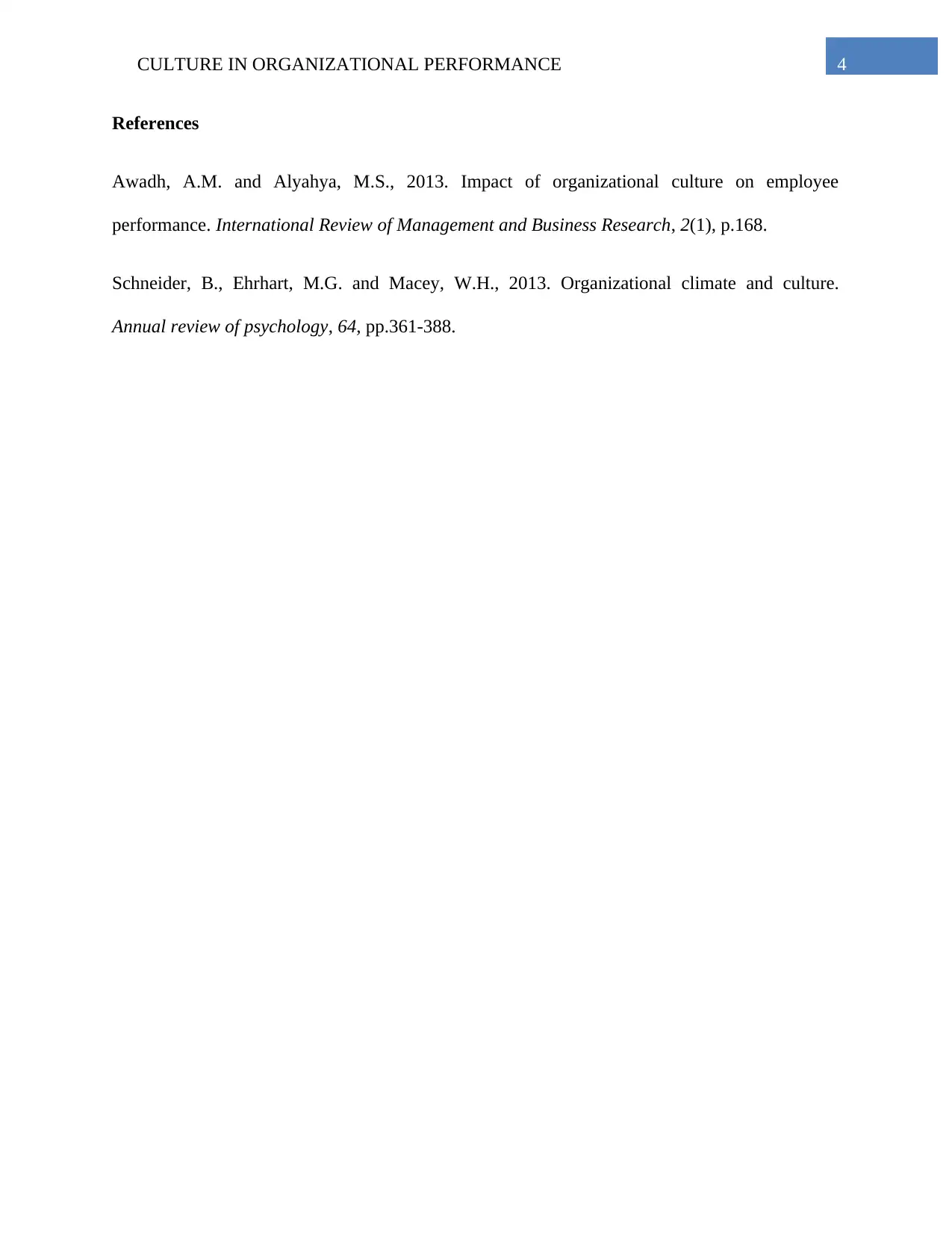
4CULTURE IN ORGANIZATIONAL PERFORMANCE
References
Awadh, A.M. and Alyahya, M.S., 2013. Impact of organizational culture on employee
performance. International Review of Management and Business Research, 2(1), p.168.
Schneider, B., Ehrhart, M.G. and Macey, W.H., 2013. Organizational climate and culture.
Annual review of psychology, 64, pp.361-388.
References
Awadh, A.M. and Alyahya, M.S., 2013. Impact of organizational culture on employee
performance. International Review of Management and Business Research, 2(1), p.168.
Schneider, B., Ehrhart, M.G. and Macey, W.H., 2013. Organizational climate and culture.
Annual review of psychology, 64, pp.361-388.
1 out of 5
Related Documents
Your All-in-One AI-Powered Toolkit for Academic Success.
+13062052269
info@desklib.com
Available 24*7 on WhatsApp / Email
![[object Object]](/_next/static/media/star-bottom.7253800d.svg)
Unlock your academic potential
Copyright © 2020–2025 A2Z Services. All Rights Reserved. Developed and managed by ZUCOL.





